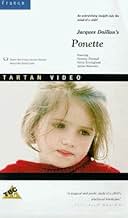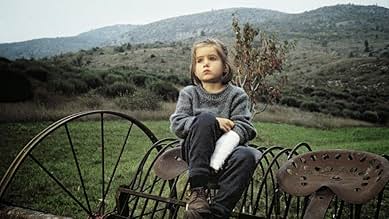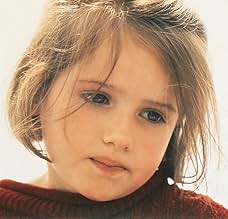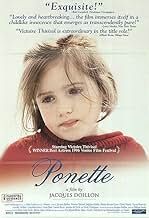VALUTAZIONE IMDb
7,5/10
4886
LA TUA VALUTAZIONE
Una bambina di quattro anni cerca di venire a patti con la morte improvvisa di sua madre.Una bambina di quattro anni cerca di venire a patti con la morte improvvisa di sua madre.Una bambina di quattro anni cerca di venire a patti con la morte improvvisa di sua madre.
- Regia
- Sceneggiatura
- Star
- Premi
- 11 vittorie e 6 candidature totali
Benjamin Charles
- Anthony
- (as Benjamin Lemaire)
Luna Ragheb
- Ponette
- (voce)
Recensioni in evidenza
is given by 4 year-old Victoire Thivisol. Differences in how people deal with death and the role religion plays are brought into focus in this outstanding, thought provoking and unrelenting heartbreaking film. Death and religion are difficult enough concepts for adults but to thrust them upon a 4 year old child and watch her battle to understand why her mother is dead is captured beautifully and thoughtfully in Ponette. This is a must see.
I do not believe I have ever seen a film that comes anywhere close to "Ponette" before. While I would not consider it my favorite film that I could watch over and over and over, it is easily one of the stronger movies I have seen. Rarely do I view a film that is so precise and cohesive even though it simultaneously plays off so many different themes, like sentimentallity, nostalgia (we all remember the strange social world of the playground though maybe some of us don't want to go back), the pain of loss, and (gasp) humor. Most directors and actors would get lost at one point or another, not knowing how to segue or shift from one tone to another, but here there is nary a problem with doing so, which is especially amazing considering the leading lady has been walking and talking for about as long as it takes to make a bowl of oatmeal.
The best scenes for me were the trials that the older girl put Ponette through. The dumpster one was especially great. Considering that early on in the film I sympathized with Ponette when she cried during some scenes, I felt bad laughing at her suffering through the tests, especially when her hand got caught when the dumpster lid came down. I believe some of this movie was improv, so for all I know, the poor girl really got her hand hurt, but I remember those type of moments as a child; those tests of stamina, durability, agility, etc. I put my younger brother through some horrific ones. One time he broke his arm. How could I have been so cruel?
A performance artist/singer named Suran Song recommended I watch this film. In Suran's performance, she actually uses slides of the scene where the mean little punk Antoine is playing with Ponette on the playground and begins to verbally abuse her about her mothers death. The context Suran used the scene in her act seemed to be making a statement about how people treat others in society, even when very young. Interesting how she sort of sampled an individual scene and made it into a story of her own, because it plays much differently in the film as a whole (obviously) since we know the characters.
Probably not for everyone, but certainly for those who want to a see a piece of work very left-of-center yet not oddball in any way; simply a viewpoint that wouldn't normally seem worth making an entire feature film out of because it would be hard to pull off. Ponette is not only pulled off... it goes flying to the moon.
The best scenes for me were the trials that the older girl put Ponette through. The dumpster one was especially great. Considering that early on in the film I sympathized with Ponette when she cried during some scenes, I felt bad laughing at her suffering through the tests, especially when her hand got caught when the dumpster lid came down. I believe some of this movie was improv, so for all I know, the poor girl really got her hand hurt, but I remember those type of moments as a child; those tests of stamina, durability, agility, etc. I put my younger brother through some horrific ones. One time he broke his arm. How could I have been so cruel?
A performance artist/singer named Suran Song recommended I watch this film. In Suran's performance, she actually uses slides of the scene where the mean little punk Antoine is playing with Ponette on the playground and begins to verbally abuse her about her mothers death. The context Suran used the scene in her act seemed to be making a statement about how people treat others in society, even when very young. Interesting how she sort of sampled an individual scene and made it into a story of her own, because it plays much differently in the film as a whole (obviously) since we know the characters.
Probably not for everyone, but certainly for those who want to a see a piece of work very left-of-center yet not oddball in any way; simply a viewpoint that wouldn't normally seem worth making an entire feature film out of because it would be hard to pull off. Ponette is not only pulled off... it goes flying to the moon.
This 1996 French film is reminiscent of an earlier French film from the 60s; Serge Bourguignon's "Sundays and Cybele", which also featured an astounding performance by a young girl, the remarkable Patricia Gozzi (Rapture '65)
Director/Writer Jacques Doillon has achieved the almost impossible with this production, in fact it would seem as if the story was built around the talents of its remarkable young child star; four year old Victoire Thivisol. Very few four year olds could manage the intense work required to bring this story to life. The Director (and or Producer) has wisely gathered a crew of highly specialized technical professionals, who create the incredible illusion the viewer is following the lives of the characters as they unfold.
Cinematographer: Caroline Champetier is known for her vivid Documentaries and features (Of Gods and Men '10 ~ Last Days in Jerusalem '11 ~ The Bear '88) Then, to piece the images together seamlessly, they chose Editor/Director: Jacquelne (Fano) Lecompte, known for her collaborations with documentary director Francois Bel. Both Bel and Lecompte won awards for their "Territory of Others" in 1970. When you also add to the above, Camera Operator/Director of Photography: Julien Hirsch (Korkoro '09) they made for a very solid collaborative team - all documentary trained filmmakers of renown.
Some reviewers have quite reasonably drawn attention to the use of such a young cast for a highly emotional subject...dealing with the death of a beloved parent (in this case the girls own mother) This child has numerous harrowing scenes, including clawing at the earth of her mother's grave begging for her to "come back"! The method chosen for ending the film is good, but a little jarring...with the appearance of the girls mother! This could be taken as a child's imaginings, but these scenes are filled with very 'real' details - leaving the viewer unsure. Ponette's mother is played by Marie Trintignant, who just a few years later would sadly go to her own grave at only 41. With so many tears of tragedy needed throughout the entire story, it makes one wonder about the methods of prompting required to elicit so much from a four year old?
The film makers and distributors must also have been concerned, as the video cover features an entire two page disclaimer - regarding managing the effects on the child star --written by a Psychologist--. Makes you wonder. Composer Philippe Sarde (Tess '79 ~ The Bear '88 ~ The Tenant '76) has written a sensitively expressive music score that's never intrusive. The adult characters in the early stages of the film can seem a little sketchy, with Ponette's father abandoning his grieving daughter by going away for an unexplained reason, leaving her in boarding school or with various relatives. Some of the scenes with her Auntie (and cousin's) do manage to achieve a level of interest and thoughtfulness.
A beautiful film for those who like a special kind of story telling or love children. The Tartan VHS release is OK, but appears to be a rare find on DVD.
Director/Writer Jacques Doillon has achieved the almost impossible with this production, in fact it would seem as if the story was built around the talents of its remarkable young child star; four year old Victoire Thivisol. Very few four year olds could manage the intense work required to bring this story to life. The Director (and or Producer) has wisely gathered a crew of highly specialized technical professionals, who create the incredible illusion the viewer is following the lives of the characters as they unfold.
Cinematographer: Caroline Champetier is known for her vivid Documentaries and features (Of Gods and Men '10 ~ Last Days in Jerusalem '11 ~ The Bear '88) Then, to piece the images together seamlessly, they chose Editor/Director: Jacquelne (Fano) Lecompte, known for her collaborations with documentary director Francois Bel. Both Bel and Lecompte won awards for their "Territory of Others" in 1970. When you also add to the above, Camera Operator/Director of Photography: Julien Hirsch (Korkoro '09) they made for a very solid collaborative team - all documentary trained filmmakers of renown.
Some reviewers have quite reasonably drawn attention to the use of such a young cast for a highly emotional subject...dealing with the death of a beloved parent (in this case the girls own mother) This child has numerous harrowing scenes, including clawing at the earth of her mother's grave begging for her to "come back"! The method chosen for ending the film is good, but a little jarring...with the appearance of the girls mother! This could be taken as a child's imaginings, but these scenes are filled with very 'real' details - leaving the viewer unsure. Ponette's mother is played by Marie Trintignant, who just a few years later would sadly go to her own grave at only 41. With so many tears of tragedy needed throughout the entire story, it makes one wonder about the methods of prompting required to elicit so much from a four year old?
The film makers and distributors must also have been concerned, as the video cover features an entire two page disclaimer - regarding managing the effects on the child star --written by a Psychologist--. Makes you wonder. Composer Philippe Sarde (Tess '79 ~ The Bear '88 ~ The Tenant '76) has written a sensitively expressive music score that's never intrusive. The adult characters in the early stages of the film can seem a little sketchy, with Ponette's father abandoning his grieving daughter by going away for an unexplained reason, leaving her in boarding school or with various relatives. Some of the scenes with her Auntie (and cousin's) do manage to achieve a level of interest and thoughtfulness.
A beautiful film for those who like a special kind of story telling or love children. The Tartan VHS release is OK, but appears to be a rare find on DVD.
10Jason-38
Even on home video, PONETTE retains its remarkable power. It remains one of the most haunting and affecting studies of childhood on film. Victoire Thivisol's performance in the title role continues to be moving and totally disarming. It's a rare talent that can carry an emotionally demanding role in a film in which the lead appears in nearly every scene. The fact that it is a four year old child is simply staggering.
If there is any ground for complaint about the DVD release, it's the fact that the film appears in "Standard Format" instead of a full ratio Widescreen edition. In any event, PONETTE is a welcome addition to my DVD collection. In fact, it is a title that I wouldn't want to be without.
If there is any ground for complaint about the DVD release, it's the fact that the film appears in "Standard Format" instead of a full ratio Widescreen edition. In any event, PONETTE is a welcome addition to my DVD collection. In fact, it is a title that I wouldn't want to be without.
10pjl-7
Nobody watching this film can failed to be touched, moved, transported and transformed by it. Others here have already expressed the enormous power of the movie, and particularly of its star, Victoire Thivisol. If you're reading this to see if you should watch it, I'd say, drop everything and go buy it so you can watch it over and over. But buy a case of Kleenex (TM) too, you're going to need them!
As I watched the movie, I had the impression that director Jacques Doillon had simply found a real-life tragedy and somehow followed the participants through it with his camera. Nothing in this film gives you the impression of having been written, scripted, staged, produced. It is all so completely natural that you experience first hand the pain, the emotional agony of Ponette, as if she were your own daughter, your own sister, even your own self.
As I watched the movie, I had the impression that director Jacques Doillon had simply found a real-life tragedy and somehow followed the participants through it with his camera. Nothing in this film gives you the impression of having been written, scripted, staged, produced. It is all so completely natural that you experience first hand the pain, the emotional agony of Ponette, as if she were your own daughter, your own sister, even your own self.
Lo sapevi?
- QuizThe magic spell the kids say, "Ta'ali Takum", is actually the "Talitha koum" of Jesus. In Mark 5:41, Jesus says the phrase "Talitha koum" (Aramaic for "Little girl, get up") to a dead girl, when he resurrects her.
- BlooperIn the cemetery scene, Ponette is shown piling dirt onto her legs as she kneels beside the grave. In the next shot, her legs have no dirt and her pants are clean.
- Citazioni
La Fille de l'Internet: You shouldn't be so sad.
Ponette: Yes, I should.
La Fille de l'Internet: Your mother was sad, too. She cried on her way to Heaven. God cried as He waited for her. When God was on earth as Jesus, He cried, too. But usually He was as joyful as a child.
Ponette: It isn't joyful to be a child.
I più visti
Accedi per valutare e creare un elenco di titoli salvati per ottenere consigli personalizzati
- How long is Ponette?Powered by Alexa
Dettagli
Botteghino
- Lordo Stati Uniti e Canada
- 1.300.377 USD
- Lordo in tutto il mondo
- 1.300.377 USD
- Tempo di esecuzione1 ora 37 minuti
- Colore
- Mix di suoni
- Proporzioni
- 1.66 : 1
Contribuisci a questa pagina
Suggerisci una modifica o aggiungi i contenuti mancanti

























